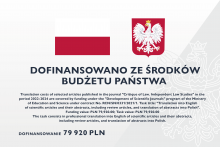Maciej Perkowski; Wojciech Zoń; Izabela Kraśnicka; Wioleta Hryniewicka-Filipkowska; Małgorzata Skórzewska-Amberg; Ewa M. Kwiatkowska; Katarzyna Staszyńska; Maciej Oksztulski
2025
17
( 1 )
DOI: 10.7206/kp.2080-1084.764
Abstrakt
This article analyses the impact of legal research on the education of future lawyers in Poland, focusing in particular on legal regulations and educational practices. The study aims to explain how the findings of research projects, especially of those funded by the National Science Centre (NSC)10, can be applied in teaching. The authors hypothesise that basic research has a minimal effect on legal education, which may result from the applicable legislation and internal conditions within university. The research involved an analysis of legal documents, a literature review, as well as surveys and interviews with academic staff. It examined the relationship between research and teaching activities in the context of higher education reform. The findings indicate that while most academics perceive their teaching and research as synergistic, there exist barriers in this areas – such as low motivation for research among students. The authors emphasise the need for reforms to better integrate research with teaching, which is crucial for enhancing the quality of legal education.
Jan Chmielewski
2024
16
( 4 )
DOI: 10.7206/kp.2080-1084.718
Abstrakt
This article is a contribution to the biography of Professor Andrzej Kabat – a prosecutor, legal counsel, judge of the highest courts of the Republic of Poland, and a longtime academic teacher. The study discusses selected jurisprudential achievements of Professor Andrzej Kabat from the period when he held the office of a judge of the Constitutional Tribunal and the Supreme Administrative Court. Moreover, there are also references to his research on the institution of questions of law submitted to the Constitutional Tribunal, which is regarded as pioneering in the science of law, despite the fundamental changes in the political system. What marks the discussed output of Professor Kabat is both the relevance of his ideas and the great significance for the practice of application of the law.
Jan Chmielewski
2024
16
( 4 )
DOI: 10.7206/kp.2080-1084.717
Abstrakt
This article is a contribution to the biography of Professor Andrzej Kabat – a prose-cutor, legal counsel, judge of the highest courts of the Republic of Poland, and a long-time academic teacher. The study discusses selected jurisprudential achieve-ments of Professor Andrzej Kabat from the period when he held the office of a judge of the Constitutional Tribunal and the Supreme Administrative Court. Moreover, there are also references to his research on the institution of questions of law sub-mitted to the Constitutional Tribunal, which is regarded as pioneering in the science of law, despite the fundamental changes in the political system. What marks the discussed output of Professor Kabat is both the relevance of his ideas and the great significance for the practice of application of the law.
Oskar Skarbek
2024
16
( 1 )
DOI: 10.7206/kp.2080-1084.666
Abstrakt
The article addresses the problem of fabrication and falsification of scientific research in the context of the role that lawmakers can play in combating this practice. Legislators may establish organisational units specialising in combating scientific misconduct (also referred to as ‘research misconduct’), having the authority to, for instance, to conduct investigations or recommend penalties. A researcher who commits such misconduct may face not only disciplinary, but also civil, administrative or criminal liability. The article discusses the results of a survey asking 70 Polish academics about their opinion on the role of legislators in countering fabrication and falsification in research. The findings show, for example, that respondents mostly support disciplinary responsibility for such misconduct (81%), and also believe that legislators should combat this practice using ‘soft’ measures, such as promoting codes of ethics in research (70%). Half of those surveyed wanted such behaviour criminalised. According to almost half of the respondents, the Polish legislator does not combat such misconduct effectively.
Maciej Perkowski; Izabela Kraśnicka; Anna Drabarz; Wojciech Zoń; Maciej Oksztulski; Małgorzata Skórzewska-Amberg; Ewa, M. Kwiatkowska
2023
15
( 2 )
DOI: 10.7206/kp.2080-1084.603
Abstrakt
The aim of the article is to provide an overview of the international and EU law framework concerning the relation between the research and teaching. The analysis of internal regulations of selected European states is provided for a broader vision and comparative perspective. Such an overview constitutes the initial ground for further research and evaluation of the applicable law and its implementation. The article constitutes a summary of the initial phase of the research project dedicated to the impact of the legal research on legal education based on the projects funded by the Polish National Science Centre.
Marta Woźniak
2023
15
( 2 )
DOI: 10.7206/kp.2080-1084.602
Abstrakt
The article of a review character undertakes a polemic with the authors of the book edited by M. Nowak entitled The Role of the Law in the Spatial Management System on spatial planning and development presented from the perspective of the law. The authors undertook to present the role of law in the spatial management system, but they did so taking into account the fact that in spatial planning, apart from lawyers, there are also such participants as urban planners, city and landscape architects, officials and the public. In the book there are not only material legal accents embedded in the themes of environment, cultural landscape and monuments, but also procedural threads. There are issues of a general nature, concerning the role and interpretation of the law, interdisciplinary issues, reach ing into other sciences (economics, urban planning), specific issues (fee) and issues of a changing and dynamic nature (COVID-19 and spatial policy). The work strongly emphasises the axiological dimension with references to phrases such as public interest or common good. In good conscience, I recommend reading the book to all those interested in ‘planning law’ in the broadest sense of the term, and to those who prefer the intersection of legal and non-legal sciences. The book will also appeal to the academic community and the legal profession.
Natalia Kohtamäki
2023
15
( 1 )
DOI: 10.7206/kp.2080-1084.577
Abstrakt
The main thesis of the article concerns the pluralism of expert legal language. Such an assumption contradicts the tradition of development of legal dogmatics, which, especially in its conservative approach, assumes monism of legal language. New trends in social sciences introduce post-positivist approaches that suggest a multiplicity of research perspectives. This multiplicity is also translated into modifications of the conceptual grid. The Eurocentric vision of law is one of many parallel narratives, and the reception of European models has nowadays an increasingly conscious and functionally justified character.
Paweł Smoleń; Marzena Świstak
2022
14
( 3 )
DOI: 10.7206/kp.2080-1084.545
Abstrakt
The Polish Personal Income Tax Law provides for a relatively extensive group of tax exemptions related to various benefits offered to doctoral students and academics. It also includes an exemption for scholarships and assistance grants referred to in Law 2.0, as well as scholarships received under programmes or projects aimed at implementing the current state scientific policy. The rule adopted is that the exemption applies as long as the rules for granting the scholarships and grants in question them have been approved by the minister in charge of higher education and science. The research objective adopted in the gloss is to verify the jurisprudential practice regarding the issue of the tax exemption in question. The analysis and evaluation have been performed also in the context of the guidelines and ideas behind the reform of higher education and science (regulations of the so-called Law 2.0). This gloss is a critical commentary. It makes use of dogmatic-legal and normative analysis.
Jolanta Jabłońska-Bonca
2019
11
( 4 )
DOI: 10.7206/kp.2080-1084.346
Abstrakt
Academics and faculty members are entangled in many interests. Selfless science for cognitive purposes is a thing of the past. There is a constant game of the power over knowledge. Apart from scientists, many entities with various interests are participants of the game. They are: politicians, officials, academic administration, research sponsors, accreditation agencies, publishers, resort scientific institutes, industry, business. The scientists themselves sometimes work for the truth and sometimes they work for profit; they create knowledge which is public property, or when they are employed commercially, e.g. by the industry, they create private knowledge. This paper presents five factors which may contribute to restricting the cognitive autonomy of the scientists.
Wyświetleń 2720
Pobrań 1006
Łukasz Kierznowski
2020
12
( 2 )
DOI: 10.7206/kp.2080-1084.386
Abstrakt
The purpose of the article is to indicate the selected potential and desired consequences of establishing doctoral schools to educate doctoral students in the field of legal sciences, with a special consideration of the interdisciplinary nature of such schools. The paper addresses the Polish legal framework. The article proposes a thesis that doctoral schools have a chance to benefit the education of future doctors of law, especially thanks to their interdisciplinary nature, which involves
Wyświetleń 2742
Pobrań 2176
Jolanta Jabłońska-Bonca
2019
11
( 4 )
DOI: 10.7206/kp.2080-1084.345
Abstrakt
Academics and faculty members are entangled in many interests. Selfless science for cognitive purposes is a thing of the past. There is a constant game of the power over knowledge. Apart from scientists, many entities with various interests are participants of the game. They are: politicians, officials, academic administration, research sponsors, accreditation agencies, publishers, resort scientific institutes, industry, business. The scientists themselves sometimes work for the truth and sometimes they work for profit; they create knowledge which is public property, or when they are employed commercially, e.g. by the industry, they create private knowledge. This paper presents five factors which may contribute to restricting the cognitive autonomy of the scientists.
Anna Łabno
2018
10
( 2 )
DOI: 10.7206/kp.2080-1084.199
Abstrakt
The Act on Higher Education and Science of 2018 considerably restricts the internal autonomy of universities. Management is vested in rectors and university boards while neglecting the role of faculties, which, if established in the first place, have been reduced to entities of no significance. The rector, as the exclusive managerial body of an institution, and the university board, representing mainly external stakeholders, as a body supervising its economy, have been vested with such an ex-tensive authority that this may result in hindering the development of multiple academic disciplines, especially those in the area of the humanities, but also in the field of social studies in many cases.
Wojciech Cyrul; Jerzy Stelmach
2018
10
( 2 )
DOI: 10.7206/kp.2080-1084.191
Abstrakt
This text is a contribution to the discussion on the reform of higher education in Poland. By referring to selected examples, it shows that the planned changes are based on several fundamental myths resulting from the inefficiency of earlier attempts to heal the university system. At the same time, it aims to show why it is necessary to abandon the belief that higher education can be reformed quickly, with little financial outlays, and that the results of the implemented changes can be instant. The text offers also a criticism of the view assuming that the expected changes can be arrived at only through a reform of the law, and that it is possible to transplant solutions functioning in other countries directly to Poland. The presented considerations oppose the position according to which there exist some ideal models of education and research, whose implementation can make it possible to “breed” an ideal scholar. Arguing that education and academic success will always be an outcome of many variables, a critical analysis of selected solutions included in the law on science and higher education has been offered as well.






